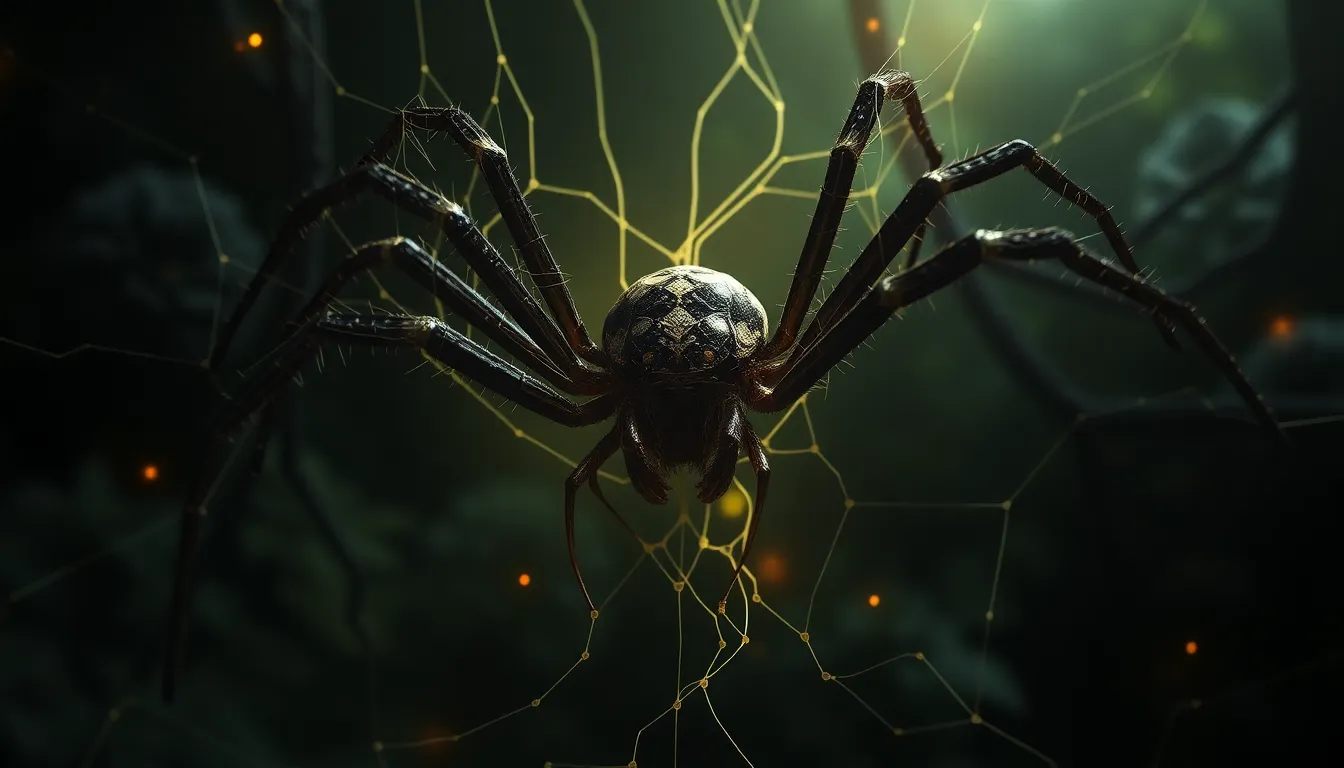The Sacred Spider: Weaving Myths Across Cultures
I. Introduction
The concept of the sacred spider is deeply woven into the mythologies of various cultures around the world. These eight-legged creatures often symbolize creation, weaving, and connection, transcending mere biology to become potent symbols in human narratives.
Spiders hold a significant place in diverse cultural narratives, embodying a dual nature that evokes both fear and reverence. From ancient stories to modern interpretations, the spider’s image has evolved, yet its fundamental symbolism remains intact.
This article will explore the multifaceted roles of spiders in mythology, examining their symbolism across cultures, their significance in indigenous mythologies, ancient civilizations, and modern interpretations, as well as their enduring legacy in religion and spirituality.
II. The Symbolism of Spiders in Different Cultures
Throughout human history, spiders have been depicted in various ways, reflecting the complexities of their existence. Common themes include:
- Creators and Weavers: Spiders are often seen as artisans, weaving intricate webs that symbolize the fabric of life.
- Fear and Reverence: While some cultures fear spiders, others revere them as sacred beings or symbols of wisdom.
- Interconnectedness: The web of a spider serves as a metaphor for interconnectedness in life and the universe.
III. The Spider in Indigenous Mythologies
Across indigenous cultures, spiders often play crucial roles in creation myths and storytelling.
A. Native American Stories and the Spider Woman Archetype
In many Native American tribes, the Spider Woman is a revered figure. She is seen as a creator who weaves the world and teaches people how to create art and craft. For instance, in the Navajo tradition, she is a guide for weaving and a protector of the people.
B. The Role of Spiders in African Folklore
In African folklore, spiders are often depicted as clever tricksters. Anansi, the spider god from West African tales, is famous for using his wits to outsmart larger animals, symbolizing intelligence and resourcefulness.
C. Australian Aboriginal Myths Involving Spiders
In Australian Aboriginal mythology, the spider is associated with the creation of the world. The Rainbow Serpent, often depicted alongside spiders, illustrates the interconnectedness of life and the environment.
IV. The Spider in Ancient Civilizations
Spiders have also played significant roles in the mythologies of ancient civilizations.
A. Egyptian Mythology and the Goddess Neith
In ancient Egypt, Neith, the goddess of war and weaving, is often associated with the spider. She represents the intricate patterns of creation and the duality of life.
B. The Significance of Spiders in Mesopotamian Lore
In Mesopotamian mythology, spiders are linked to the goddess Inanna, who embodies love, war, and fertility, showcasing the spider’s multifaceted symbolism.
C. Greco-Roman Interpretations of Spiders and Their Roles
In Greek mythology, the tale of Arachne, a skilled weaver transformed into a spider, highlights themes of hubris and the consequences of challenging the gods.
V. The Spider in Eastern Mythology
Eastern cultures have also embraced spiders within their mythologies.
A. The Significance of Spiders in Hindu Mythology
In Hinduism, spiders symbolize the web of life and the interconnectedness of all beings. The deity Vishnu is sometimes associated with the spider, representing creation and preservation.
B. Chinese Myths Featuring Spiders and Their Meanings
Chinese mythology often portrays spiders as symbols of good fortune. The story of the spider who weaves a beautiful web to attract a mate reflects themes of love and connection.
C. The Role of Spiders in Japanese Folklore and Shinto Beliefs
In Japan, spiders are both feared and revered. The creature Jorogumo, a spider that can transform into a woman, embodies the dual nature of beauty and danger.
VI. The Sacred Spider in Modern Culture
In contemporary society, spider symbolism continues to thrive.
A. The Impact of Spider Symbolism in Literature and Film
From Charlotte’s Web to the horror genre, spiders have made their mark in literature and film, symbolizing themes of friendship, fear, and the unknown.
B. Contemporary Interpretations of the Sacred Spider
Modern interpretations often blend ancient myths with contemporary issues, exploring themes of empowerment, creativity, and resilience.
C. The Spider in Art and Fashion
Artists and designers frequently draw inspiration from spiders, using their intricate patterns and forms to create visually stunning works.
VII. Myths of Creation and Destruction: Spiders as Dual Forces
Spiders embody dual forces in various myths.
A. Myths Where Spiders Create Worlds
Anansi, the spider from African folklore, is a prime example of a creator who uses cunning to shape the world and impart wisdom.
B. Stories of Spiders as Harbingers of Danger
Conversely, the story of Arachne warns against pride and the consequences of defying divine power, showcasing the darker side of spider mythology.
C. The Balance of Creation and Destruction in Spider Myths
This duality reflects the balance of life itself, where creation and destruction coexist and are necessary for the cycle of existence.
VIII. Spiders in Religion and Spirituality
Religious texts and spiritual practices often incorporate spider symbolism.
A. The Role of Spiders in Various Religious Texts
In some traditions, spiders are mentioned as symbols of fate and destiny, weaving the threads of life for individuals.
B. Spiritual Practices Involving Spiders Across Cultures
Some cultures engage in rituals that honor spiders, seeking their wisdom and protection through offerings and prayers.
C. The Symbolism of Spiders in Dream Interpretation
In dream analysis, spiders may represent creativity, patience, or feelings of entrapment, depending on the context of the dream.
IX. Conclusion
Spiders hold diverse roles in mythology, symbolizing creation, wisdom, fear, and interconnectedness across cultures. The sacred spider’s legacy endures as it continues to weave itself into the fabric of human storytelling.
As we reflect on these myths, it becomes evident that the symbolism of spiders remains relevant, offering insights into our understanding of life, creativity, and the balance of forces within our world.
X. Further Reading and Resources
To delve deeper into the fascinating world of spider mythology, consider exploring the following resources:
A. Recommended Books and Articles on Spider Mythology
- The Spider’s Thread: A Study of Myth and Legend by Anika S. Fox
- Webs of Wonder: The Mythology of Spiders by Lloyd R. Carter
B. Links to Documentaries and Films About Spiders in Culture
C. Online Resources for Exploring Spider Symbolism in Various Traditions



